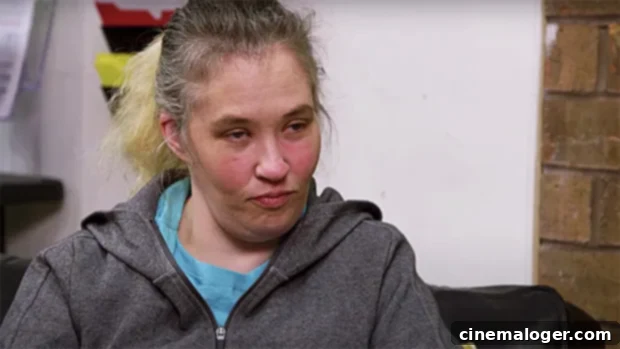Mama June’s Emotional Rehab Intervention: Pumpkin Fights for Her Mother Amidst Addiction and Homelessness
In a deeply emotional and pivotal moment, Lauryn “Pumpkin” Shannon confronts her mother, Mama June Shannon, about her ongoing struggles with addiction. This exclusive preview from the June 12 episode of Mama June: Family Crisis reveals a heartbreaking intervention where Pumpkin desperately tries to guide her mother towards a path of recovery. The conversation quickly escalates, laying bare the profound impact June’s choices have had on her family, particularly her daughters, and highlighting the challenging journey ahead for everyone involved. The severity of June’s situation, including her reported homelessness, casts a long shadow over their exchange, emphasizing the critical need for immediate and effective help.
The intervention begins with Pumpkin addressing a fundamental issue: communication. “Alana can’t even call her own mother. I can’t even call you. You’ve got to have a working phone,” Pumpkin states, her voice laced with frustration and concern. This seemingly simple request underscores the extent of Mama June’s detachment from her family, who have been desperately trying to reach out and offer support. A functioning phone is more than just a convenience; it’s a lifeline, a basic necessity for maintaining connections and ensuring safety, especially when one is in a vulnerable position.
Mama June, seemingly open to some initial steps, agrees to get a phone. However, Pumpkin’s demands quickly intensify as she outlines a structured plan for accountability. “You have to take a weekly drug test,” Pumpkin asserts, aiming to establish a routine of transparency and trust that has been severely eroded by June’s addiction. This requirement is a crucial step towards rebuilding faith within the family, demonstrating a commitment to sobriety that goes beyond mere promises. It’s an essential component of any recovery plan, offering concrete evidence of progress and a deterrent against relapse.
The conversation reaches its most critical point when Pumpkin introduces the core demand: “You have to go to in-patient rehab.” This proposal, often the most effective route for severe addiction, is met with an immediate and firm refusal from Mama June. Her blunt response, “No. I don’t want to in-patient. No,” instantly creates a chasm between the mother and daughter, exposing June’s deep-seated resistance to the intensive treatment her family believes she desperately needs. The silence that follows is thick with unspoken anxieties and dashed hopes.

Pumpkin, visibly disheartened but persistent, presses her mother further, attempting to understand the rationale behind her refusal. She brings up the stark reality of June’s living situation, pointing out that her mother is essentially homeless, residing in a motel. This precarious existence, often a direct consequence of addiction, should, in Pumpkin’s eyes, be a clear indicator that drastic measures like in-patient rehab are not just advisable, but absolutely necessary. For many struggling with substance abuse, a safe, structured environment away from triggers is paramount for successful recovery.
In a rare moment of candidness during her confessional, Mama June admits the grim truth of her daily life with Geno Doak. “We’re making it, but it’s barely,” she reveals, her voice tinged with a mix of resignation and weariness. “And it’s OK. I’m OK with that. But it’s hard and not being able to say, ‘Hey, can I stay the night at your house? Can I do this?’ That’s where it gets me. It’s like I can’t even call Pumpkin and say, ‘Hey, can we come sleep on your couch?’ or ‘Hey, can we come eat?’ That kills me.” Her eyes well up with tears, a powerful display of the emotional toll her current circumstances are taking. This confession offers a glimpse into the shame and isolation that often accompany addiction, even as June maintains a front of being “OK.”
June’s explanation for rejecting in-patient treatment further illuminates her internal conflict. “To me, I think in-patient is not something that I’m willing to do because I don’t want to be cut off from everything,” she tells Pumpkin. This fear of isolation, of losing contact with her current life and partner, Geno, is a common barrier to effective treatment. While in-patient facilities provide a vital separation from enabling environments and negative influences, June perceives this necessary detachment as a punishment or an unbearable severance from her perceived support system, however flawed that system might be.
Recognizing the deadlock, Mama June proposes an alternative: out-patient rehab. While a step in the right direction compared to no treatment at all, out-patient programs often lack the intensity, supervision, and structured environment crucial for individuals with severe, long-standing addictions like June’s. It allows patients to continue living at home while attending therapy sessions and group meetings, which can be challenging for someone without a stable, sober living environment and strong personal accountability.
Pumpkin, though disappointed by her mother’s refusal of in-patient care, shows a remarkable level of maturity and willingness to compromise in the face of such adversity. “I hate the idea of out-patient, but I did talk to Dr. Ish and maybe this is a step in the right direction,” she shares. Her pragmatic approach acknowledges that any forward movement is better than none. Dr. Ish, a family therapist known for his work on addiction and family dynamics, likely advised Pumpkin on the importance of meeting June where she is, even if it’s not the ideal solution. Pumpkin’s hope is that this initial step will eventually lead June to recognize the need for more intensive, in-patient treatment. “Maybe she’ll start going to out-patient and then eventually want to do in-patient. But all we can do is hope,” Pumpkin concludes, her voice conveying a mix of cautious optimism and profound weariness.
This emotional exchange underscores the brutal reality of addiction and its ripple effect on families. Mama June’s battle is not just her own; it is a shared crisis that her daughters, Pumpkin and Alana (Honey Boo Boo), have been forced to navigate for years. The repeated cycles of hope and relapse, promises broken and trust eroded, have taken a significant toll. Pumpkin’s relentless efforts, despite the visible exhaustion, highlight the deep love and concern she holds for her mother, even as she grapples with the potential of further disappointment.
The influence of Geno Doak also looms large over this intervention. His presence in June’s life, and their shared struggles, are often cited as factors hindering June’s recovery. Her reluctance to be “cut off from everything” likely includes a fear of separating from Geno, regardless of the potential toxicity of that relationship. This entanglement adds another layer of complexity to June’s path to sobriety, making a clean break for in-patient treatment even more challenging to accept.
Ultimately, this preview captures a poignant chapter in the ongoing narrative of Mama June’s journey. It’s a testament to the resilience of family bonds and the enduring hope that even in the darkest moments, recovery is possible. The intervention is not just about getting June into rehab; it’s about reclaiming a mother, a grandmother, and restoring a semblance of stability to a family torn apart by addiction. The road ahead is undoubtedly long and fraught with obstacles, but Pumpkin’s willingness to compromise offers a fragile glimmer of hope that Mama June might finally begin to turn the corner.
Viewers can follow this unfolding family drama as Mama June: Family Crisis airs Fridays at 9 p.m. on WE tv, witnessing firsthand the raw emotions and difficult decisions that come with confronting addiction head-on.
